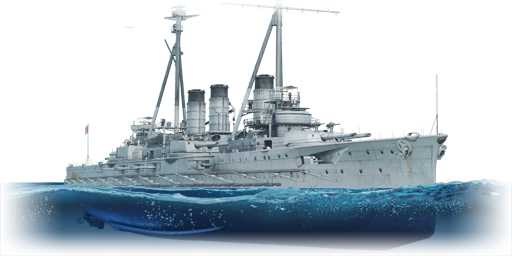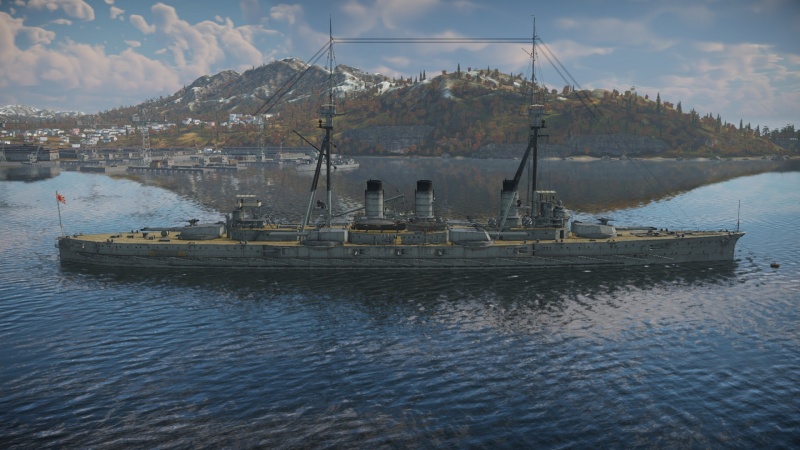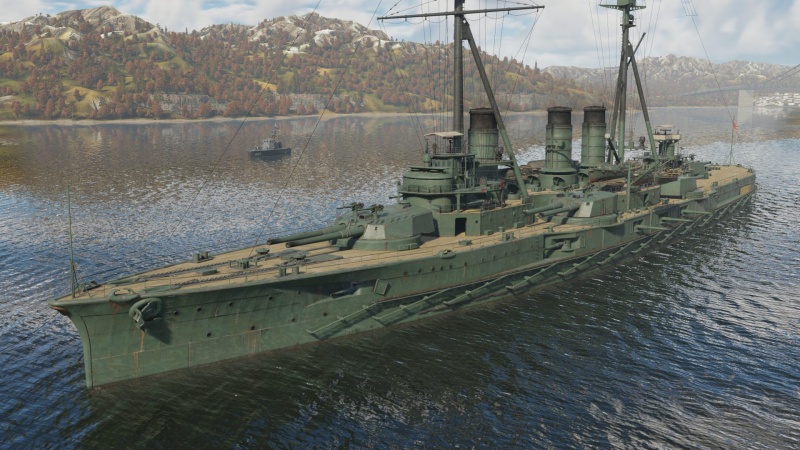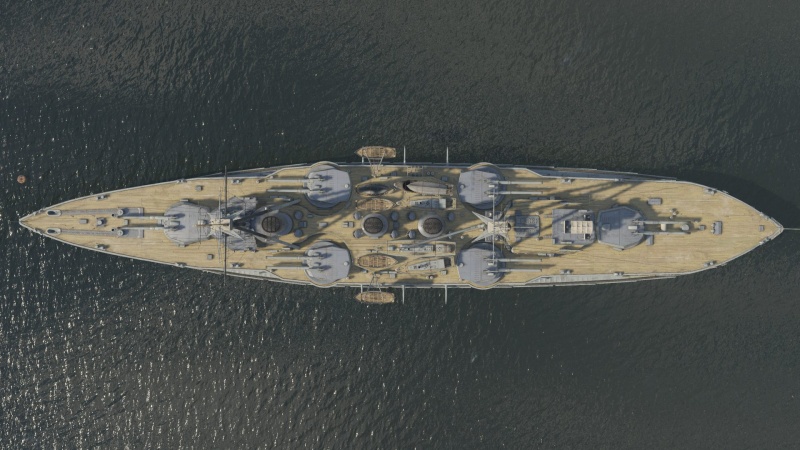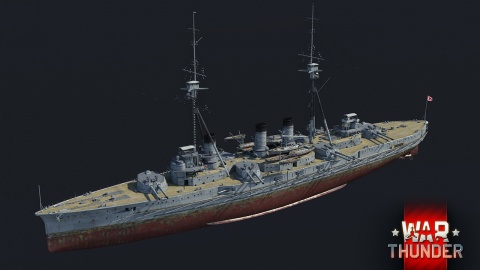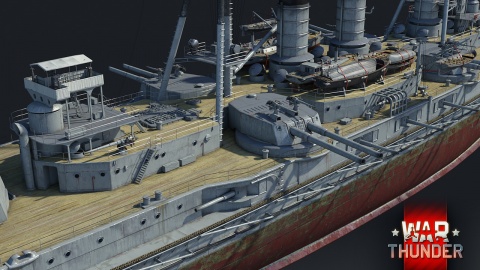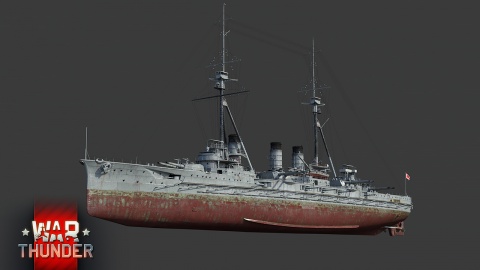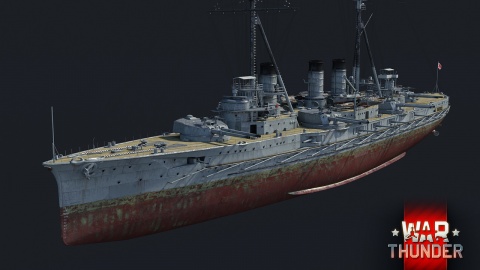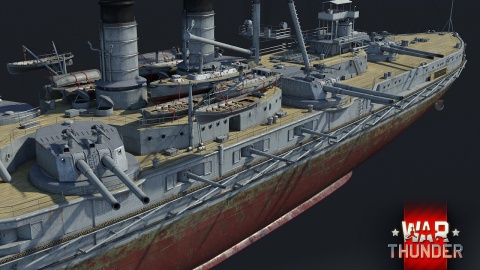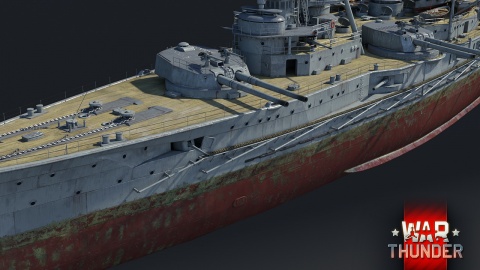IJN Settsu
Contents
Description
The Kawachi-class, IJN Settsu, 1920 (摂津, namesake: Settsu Province) Built after the Satsuma-class semi-dreadnoughts, the Kawachi-class were the first true dreadnoughts of the Imperial Japanese Navy. Uniquely among dreadnoughts, this class features a mixed-calibre main battery. The design originally used all 45-calibre main guns, but reports of the Royal Navy using 50-calibre guns in its newer battleships encouraged the IJN to adopt 50-calibre as well, though cost concerns prevented all the 45-calibers on the Kawachi design to be replaced.
It was introduced in Update "New Power". Besides the Settsu's plentiful main calibre guns, she is fairly average, with the standard 21 knots (39 km/h) top speed for its time, with a capable, but not unbreakable armour scheme.
General info
Survivability and armour
Talk about the vehicle's armour. Note the most well-defended and most vulnerable zones, e.g. the ammo magazine. Evaluate the composition of components and assemblies responsible for movement and manoeuvrability. Evaluate the survivability of the primary and secondary armaments separately. Don't forget to mention the size of the crew, which plays an important role in fleet mechanics. Save tips on preserving survivability for the "Usage in battles" section. If necessary, use a graphical template to show the most well-protected or most vulnerable points in the armour.
Mobility
Write about the ship's mobility. Evaluate its power and manoeuvrability, rudder rerouting speed, stopping speed at full tilt, with its maximum forward and reverse speed.
| Mobility Characteristics | |||
|---|---|---|---|
| Game Mode | Upgrade Status | Maximum Speed (km/h) | |
| Forward | Reverse | ||
| AB | |||
| Upgraded | 45 | 25 | |
| RB/SB | |||
| Upgraded | 39 | 22 | |
Modifications and economy
Armament
Primary armament
Provide information about the characteristics of the primary armament. Evaluate their efficacy in battle based on their reload speed, ballistics and the capacity of their shells. Add a link to the main article about the weapon: {{main|Weapon name (calibre)}}. Broadly describe the ammunition available for the primary armament, and provide recommendations on how to use it and which ammunition to choose.
| Penetration statistics | |||||||
|---|---|---|---|---|---|---|---|
| Ammunition | Type of warhead |
Penetration @ 0° Angle of Attack (mm) | |||||
| 1,000 m | 2,500 m | 5,000 m | 7,500 m | 10,000 m | 15,000 m | ||
| 12-inch/45 HE | HE | 69 | 69 | 69 | 69 | 69 | 69 |
| 12-inch/45 APC | APC | 496 | 432 | 345 | 278 | 229 | 172 |
| 12-inch/50 HE | HE | 69 | 69 | 69 | 69 | 69 | 69 |
| 12-inch/50 APC | APC | 575 | 501 | 399 | 320 | 260 | 187 |
| Shell details | |||||||||
|---|---|---|---|---|---|---|---|---|---|
| Ammunition | Type of warhead |
Velocity (m/s) |
Projectile mass (kg) |
Fuse delay (s) |
Fuse sensitivity (mm) |
Explosive mass (TNT equivalent) (kg) |
Ricochet | ||
| 0% | 50% | 100% | |||||||
| 12-inch/45 HE | HE | 825 | 400.06 | 0 | 0.1 | 37.82 | 79° | 80° | 81° |
| 12-inch/45 APC | APC | 825 | 400.06 | 0.035 | 17 | 13.64 | 48° | 63° | 71° |
| 12-inch/50 HE | HE | 915 | 400.06 | 0 | 0.1 | 37.82 | 79° | 80° | 81° |
| 12-inch/50 APC | APC | 915 | 400.06 | 0.035 | 17 | 13.64 | 48° | 63° | 71° |
Secondary armament
Some ships are fitted with weapons of various calibres. Secondary armaments are defined as weapons chosen with the control Select secondary weapon. Evaluate the secondary armaments and give advice on how to use them. Describe the ammunition available for the secondary armament. Provide recommendations on how to use them and which ammunition to choose. Remember that any anti-air armament, even heavy calibre weapons, belong in the next section. If there is no secondary armament, remove this section.
| Penetration statistics | |||||||
|---|---|---|---|---|---|---|---|
| Ammunition | Type of warhead |
Penetration @ 0° Angle of Attack (mm) | |||||
| 1,000 m | 2,500 m | 5,000 m | 7,500 m | 10,000 m | 15,000 m | ||
| 6-inch HE | HE | 43 | 43 | 43 | 43 | 43 | 43 |
| 6-inch APC | APC | 194 | 163 | 123 | 94 | 74 | 58 |
| Shell details | ||||||||||||
|---|---|---|---|---|---|---|---|---|---|---|---|---|
| Ammunition | Type of warhead |
Velocity (m/s) |
Projectile mass (kg) |
Fuse delay (s) |
Fuse sensitivity (mm) |
Explosive mass (TNT equivalent) (kg) |
Ricochet | |||||
| 0% | 50% | 100% | ||||||||||
| 6-inch HE | HE | 825 | 45.3 | 0 | 0.1 | 5.28 | 79° | 80° | 81° | |||
| 6-inch APC | APC | 825 | 45.3 | 0.01 | 7 | 1.88 | 48° | 63° | 71° | |||
Anti-aircraft armament
An important part of the ship's armament responsible for air defence. Anti-aircraft armament is defined by the weapon chosen with the control Select anti-aircraft weapons. Talk about the ship's anti-air cannons and machine guns, the number of guns and their positions, their effective range, and about their overall effectiveness – including against surface targets. If there are no anti-aircraft armaments, remove this section.
Additional armament
Describe the available additional armaments of the ship: depth charges, mines, torpedoes. Talk about their positions, available ammunition and launch features such as dead zones of torpedoes. If there is no additional armament, remove this section.
Usage in battles
Describe the technique of using this ship, the characteristics of her use in a team and tips on strategy. Abstain from writing an entire guide – don't try to provide a single point of view, but give the reader food for thought. Talk about the most dangerous opponents for this vehicle and provide recommendations on fighting them. If necessary, note the specifics of playing with this vehicle in various modes (AB, RB, SB).
Pros and cons
Pros:
- High firepower and durability
- Carries torpedoes
Cons:
- Poor mobility
- Meagre anti-air defence
- Huge profile
History
Devblog
Following the end of the Russo-Japanese War in the early 1900's, the state of the IJN was generally perceived to be unsatisfactory by high ranking Japanese officials. Furthermore, in terms of quantity and quality, the Japanese navy was lagging behind other naval powers such as Great Britain or the United States. In addition to all this, a severe economic recession following the war greatly reduced Japan's ability to build new warships and expand its naval power.
Nonetheless, a new fleet expansion strategy was adopted and whose first steps were the construction of two new dreadnought-type battleships. This resulted in the creation of the Kawachi-class, made up from the battleships Kawachi and Settsu. These two warships became the first two dreadnought-type battleships to be built by Japan.
Settsu was laid down in January 1908 at the Kure Naval Arsenal, launched in March 1911 and completed in July 1912. During WWI, Settsu served alongside her sistership, but seeing only limited action. In 1919, Settsu was put in reserve, receiving an overhaul before being disarmed in 1922 under the terms of the Washington Naval Treaty.
Shortly after, Settsu was converted into a target ship, keeping this role throughout the interwar period as well as WWII. In the end, Settsu was badly damaged by an Allied air raid on Kure in July 1945, leaving the ship beached. The ship's hulk was subsequently raised and broken up for scrap in the immediate postwar years.
Media
- Skins
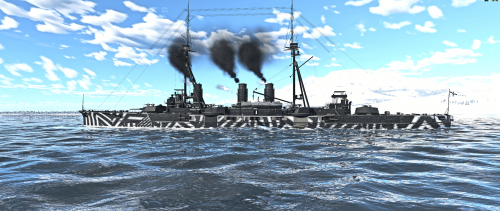
- Images
- IJN Settsu Devblog Images
- Videos
See also
Links to articles on the War Thunder Wiki that you think will be useful for the reader, for example:
- reference to the series of the ship;
- links to approximate analogues of other nations and research trees.
External links
| Kure Naval Arsenal (呉海軍工廠) | |
|---|---|
| Heavy Cruisers (CA) | |
| Mogami-class | IJN Mogami* |
| Battlecruisers (BC) | |
| Tsukuba-class | IJN Ikoma |
| Battleships (BB) | |
| Kawachi-class | IJN Settsu |
| Fusō-class | IJN Fuso |
| Note | *Initially built as a CL with 15.5 cm cannons, refitted with 20.3 cm and reclassified as a CA |
| Japan battleships | |
|---|---|
| Kawachi-class | IJN Settsu |
| Fusō-class | IJN Fuso · IJN Yamashiro |
| Ise-class | IJN Ise · IJN Hyuga |
| Kongō-class | IJN Kongo · IJN Haruna |
| Nagato-class | IJN Mutsu |


